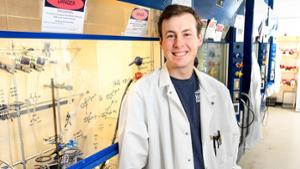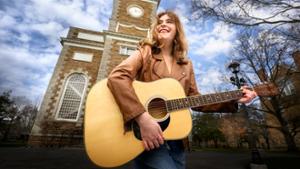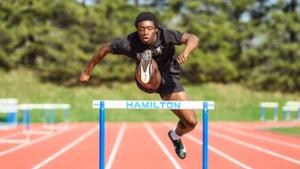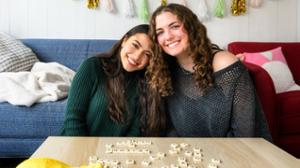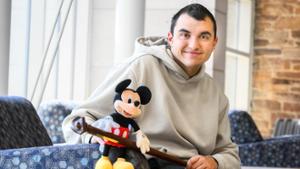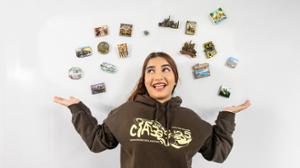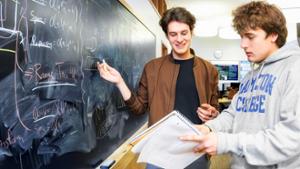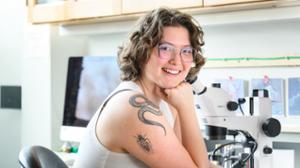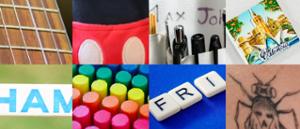
What You Take Away
Now, on the eve of their graduation, we reconnected with those same members of the Class of ’25 to ask a different question: What are you taking away from Hamilton? Their responses are as diverse and insightful as the students themselves, but each epitomizes a step on the path to “Know Thyself.”
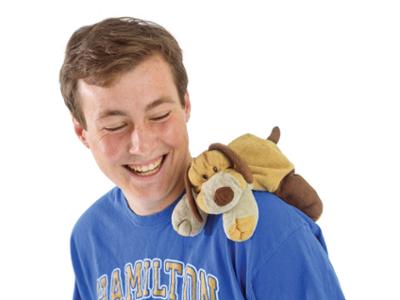
Making choices, especially those that involve risk, was something Carbone once found challenging. During his time at Hamilton, that changed. “College taught me that half of the fight is just showing up,” he said. “You can always leave early, but you might miss out on something if you never put yourself out there.”
After just one visit to Hamilton’s Climbing Wall, Carbone decided to get belay certified and then ran clinics for fellow students. He joined the Frisbee team and served the past two years as captain, and worked as an orientation and Adirondack Adventure leader. During junior year, he spent a semester studying in Copenhagen.
“I was nervous to spend four months out of the country on my own, but I ended up making some of my closest friends. I joined a Danish Frisbee team, and we played in a national tournament,” Carbone said. “I can’t imagine not having had those experiences.”
“College taught me that half of the fight is just showing up. You can always leave early, but you might miss out on something if you never put yourself out there.”
Other “ah-ha moments” came in the lab. Carbone spent two summers interning at Mass General in his hometown of Boston. He also worked with associate professors of chemistry Ian Rosenstein and Max Majireck, and was selected to present his research on synthetic versions of naturally occurring compounds at an American Chemical Society meeting in San Diego.
In the fall, Carbone will start work on his Ph.D. in organic chemistry at Penn State. His goal is to emulate his mentors by becoming a teacher/scholar at the college level and encourage future students to pursue the field of chemistry.
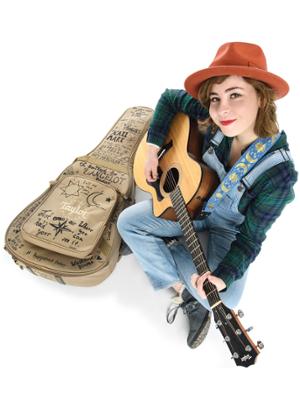
Those are Evans’ two guitars, and their names are fitting. A prolific songwriter (4,244 at last count), she performed her favorite song the first day of freshman year at an open mic. She followed that with impromptu mini-concerts in the stairwell of her Dunham residence and a show on WHCL. When Evans learned about Hamilton’s Smallen Creativity grant, she applied and received funds to record an album. Three of her songs are on Spotify, including the soulful “Rain.”
“I wrote it after a rough day. I was feeling overwhelmed, friendship circles were shifting, relationships shifting. I had a disheartening moment in class,” she said. “It’s like a prayer in song form. I’m asking the universe, ‘Hey, I’m trying. Is there something you can give back to me?’”
Although bad days can provide inspiration for songwriters, Evans is fortunate to have had plenty of good ones. She honed her craft in creative writing classes where she’s written everything from poetry about her hometown of Kent, Conn., to the beginnings of a young adult novel. She spent a summer working at a nonprofit teaching creative writing and performance to children. Junior year found her abroad, first in France and then England, where she plans to return this fall for a postgraduate degree in creative writing.
“When I came [to Hamilton], I spent time worrying about how people are perceiving me ... I now focus on what I love. I’m a writer, and that’s all I need to be.”
“When I came [to Hamilton], I spent time worrying about how people are perceiving me, what I’m going to do with my life,” she said. “I now focus on what I love. I’m a writer, and that’s all I need to be. I measure success by how I feel rather than what I accomplish.”
Having developed a chronic illness called POTS during her time at Hamilton, Evans knows what it looks like to redefine success and re-evaluate her dreams. After showing up with “Hope” and now graduating with “Resilience,” she’s taking her many lessons with her.
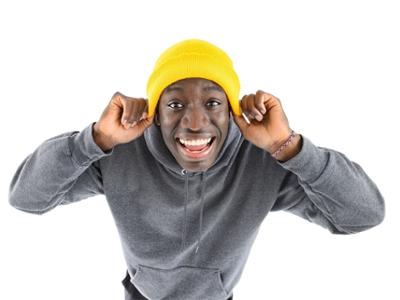
Mensah-Boateng, from Newark, N.J., was intent on a career in public health. But by sophomore year, he felt defeated. His grades were slipping in his biology courses, and he began to realize he didn’t have a passion for science. “I felt conflicted. This was my plan. Changing course felt like failure,” he said.
Then came Sociology of Health and Illness with Associate Professor of Sociology Matt Grace. Not only did Mensah-Boateng excel in that class, he started to see more than one path to achieving his goal. He interned in the healthcare management program at Northwell Health and was selected to the Summer Health Professions Education Program at the University of Iowa.
“I had the chance to work with a variety of people and really see what I liked to do and am good at,” he said. “There’s more that goes into public health than knowing how to treat people when they’re sick. There are the social factors that go into why they get sick.”
“I’ve learned how to handle things I can’t anticipate and come out more than OK. I’ve flourished.”
In addition to Grace, Mensah-Boateng sought guidance from ALEX advisor Kevin Alexander ’13, Director of Opportunity Programs Aaron Ray, and Director of Health Professions Advising Courtney Hance. “My advisors served as more than sounding boards; they helped me reevaluate what I wanted out of college and pivot in a much better direction.”
In addition to track and field, Mensah-Boateng served as co-treasurer of the NESCAC Coalition of Student-Athletes of Color and an assistant with the Chaplaincy. He also sang with the College Choir.
“Looking back [to freshman year], I see someone who in a lot of ways hasn’t changed. I’m definitely a positive person,” he said. “I do think I have matured. I’ve learned how to handle things I can’t anticipate and come out more than OK. I’ve flourished.”
What’s next? Possibly a stint with AmeriCorps.
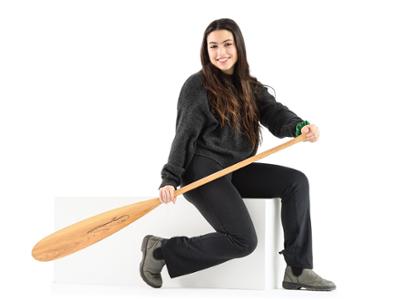
But that choice didn’t come easy. First she thought perhaps she’d focus her studies in literature. She also took calculus and biology. Things didn’t become clearer until she enrolled in Forever Wild: Natural and Cultural Histories of the Adirondacks with Onno Oerlemans, the Elizabeth J. McCormack Professor of Literature, and spent the following summer helping him with his research for a book.
Rudin followed that with a year abroad — one semester in Copenhagen, where she studied sustainability, urban design, and glaciers, and another in Hamilton’s program in Spain.
“Back then I was very indecisive, untrusting of my own opinions. The thought of choosing was overwhelming,” she said. “Going abroad helped me take chances and trust the experiences I wanted to have. I developed a better idea of what makes me happy. Living by myself in a city for the first time, I became more independent.”
“Back then I was very indecisive, untrusting of my own opinions. Going abroad helped me take chances and trust the experiences I wanted to have.”
Rudin discovered that she wants to pursue a career involving ecological monitoring or conservation work. Her senior capstone project examined the demographics within effective citizen science programs. She plans to spend some time working in a biological or field lab before pursuing a master’s degree.
As much as she’s grown during her time at Hamilton, there is one constant in Rudin’s life — she still lives with her freshman-year roommate, Olivia Strigh ’25. “We’ve both changed, and will continue to change, but we’ll never lose a part of who we were. I found a real support system in her. We will always have that connection.”
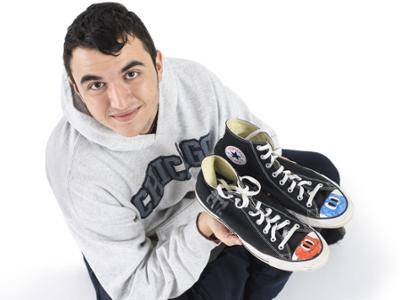
In addition to math classes, Tanelli took courses in computer science and economics. As he began thinking about math less theoretically and more through an applied lens, Hamilton introduced a new major in data science. The program encourages students to explore the societal impact of analytics and such ethical issues as privacy rights and data validity.
The new major, along with a second one in economics, turned out to be a perfect fit for Tanelli. He pursued internships that ranged from working at a small startup to assisting the supply chain and operations team at Amazon. Last fall, he completed an in-depth project in applied probability, and this spring he’s exploring industrial organization in his economics senior thesis.
Tanelli will bring his analytical and problem-solving skills to Disney Experiences, one of the Disney Company’s three main corporate divisions, as a product development and strategy analyst. In this role, he’ll help manage the development and logistics of hardline novelty products across Disney’s resorts and cruise lines. He’ll also apply his background in data science and economics to optimize revenue, streamline inventory planning, and contribute to the strategic rollout of new offerings.
“Be as open-minded as possible, especially when it comes to professors. Listen to their advice.”
What is he taking from his experience at Hamilton? “Be as open-minded as possible, especially when it comes to professors. Listen to their advice,” Tanelli said. “I knew I wanted to work in tech, but there isn’t always one go-to answer. There are so many different ways you can go, so much I didn’t know about what would best align with my interests. Talking with alumni and professors really helped me figure that out.”
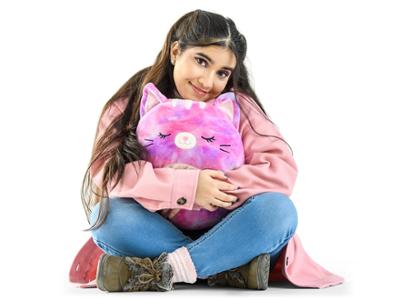
Yet Siddiqui’s hard work had paid off. She earned a Questbridge scholarship to attend Hamilton and arrived from Selden, N.Y., with two main goals: One, she would major in computer science and find a job after graduation that would offer financial stability. Two, she wouldn’t sacrifice everything else to achieve goal one.
“I missed out on so much in high school because I was constantly grinding. I never went to dances or parties. People found me annoying because I only talked about grades,” she said. “When I came to college, I shifted my perspective about perfectionism. When I saw that C+ on my transcript, I learned to move past it.”
Make no mistake; Siddiqui didn’t slack off. Her name routinely appeared on the Dean’s List, and she double majored in Hispanic studies. Although her parents initially objected, she decided to study in Spain and, carefully budgeting her time and money, visited 20 cities across six countries during her semester abroad.
“The younger Ilsaa would not have had the courage to travel out of the country alone, and it was the highlight of my time at Hamilton,” she said. “I met great people and my Spanish really improved. I actually cried at the farewell lunch.”
“When I came to college, I shifted my perspective about perfectionism. When I saw that C+ on my transcript, I learned to move past it.”
On campus, Siddiqui participated in the Debate Club, hosted a show on WHCL, and worked three campus jobs. She is active with the Feminists of Color Collective, served as vice president of the Muslim Student Association, and co-founded Byte Into Tech, where Hamilton students meet with kids at local libraries and teach them how to code.
What’s next? After interning at Erie Insurance as a software engineer last summer, Siddiqui will join Fast Enterprises this summer as an implementation consultant.
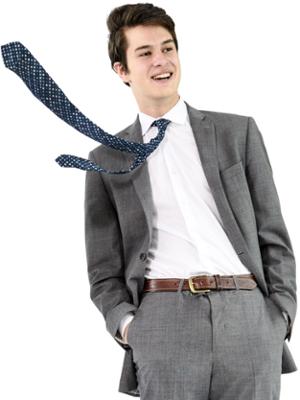
THEN: Colledge sporting the lucky tie he brought with him as a first-year student.
Colledge grew up in Milton, Mass., and enjoyed high school. He thought college would be much the same. “But now I think about all the skill-set building that takes place — developing communication skills, how to organize thoughts, how to walk into a room of people you don’t know and start talking to them. There’s so much you don’t realize [you’re learning] until later.”
In computer science classes, Colledge saw how much easier it is to hone programming skills than it is to learn how to think critically about a problem. In public policy courses, he came to appreciate not only how data is used to analyze issues, but how collaboration is key to finding solutions.
Like he planned as a first-year student, Colledge participated on the Debate Team, which finished fourth in the nation in its league last year. He applied his oratory skills as a panelist at a recent Common Ground debate. On a different field of play, he competed on the Curling and Rugby teams.
“I think about all the skill-set building that takes place — developing communication skills, how to organize thoughts, how to walk into a room of people you don’t know and start talking to them. There’s so much you don’t realize [you’re learning] until later.”
Colledge interned for three summers at investment firms in New York and Atlanta, where he helped develop software systems. After graduation he’ll start a job in systems engineering in Chicago.
What’s he taking with him? Three of his Morris House suitemates also plan to head to the Windy City. “I’m so glad I’ll be moving with them to the next stage in life,” he said. “I met a lot of people here who are going to go off and do truly amazing things.”
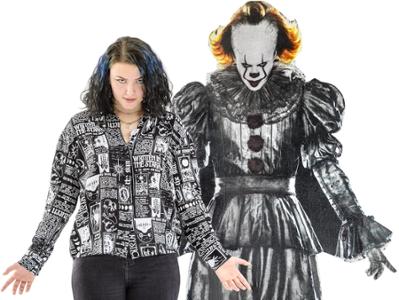
Her pursuit has deep personal meaning. Lowder’s father was diagnosed with brain cancer right before she started at Hamilton; he passed away a year later. “Dealing with that loss going into sophomore year, I felt like I had to relearn how to do everything,” she said.
Lowder leaned on her friends, professors, and on Hamilton’s Counseling Center. She threw herself into her studies and spent two years working in the lab alongside Associate Professor of Biology Rhea Datta. Along the way, Lowder developed a deeper understanding of herself, including the fact that it’s OK to admit when there’s something you don’t know.
After taking a class on Indigenous languages with Lecturer in Linguistics Meredith Moss, Lowder discovered how little she knew about Native American history and culture. Her initial reaction was to shy away from class discussion, but ultimately she decided to take additional classes. “Embracing discomfort is something I’ll take away from Hamilton,” she said, “and an appreciation for the open curriculum that offers the chance to explore a lot of different subjects and bridge my knowledge.”
Outside of the classroom, Lowder participated on the Mock Trial team, served on the eBoard for the fashion magazine Signature Style, and played bass with the band Yonic Youth. This fall she will begin work on a Ph.D. to continue her study of cancer. “My goal is to contribute to the field in any way I can,” she said.
“Embracing discomfort is something I’ll take away from Hamilton ... and an appreciation for the open curriculum that offers the chance to explore a lot of different subjects and bridge my knowledge.”
Continue Reading
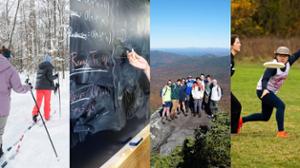
Class of 2029: First Years' First Thoughts
With their first semester at Hamilton now completed, members of the Class of 2029 took a moment to look back at their favorite classes, extracurricular clubs they’ve joined, and the faculty and ALEX advisors who have influenced them. Read about a few of our newest students — favorite spots on campus, go-to meals, and what they’ve added to their Hamilton bucket lists.
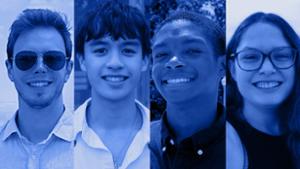
Students Explore Career Interests in Internships Around the World
Hamilton students explored career interests around the world this summer. Read about a few of them here.
